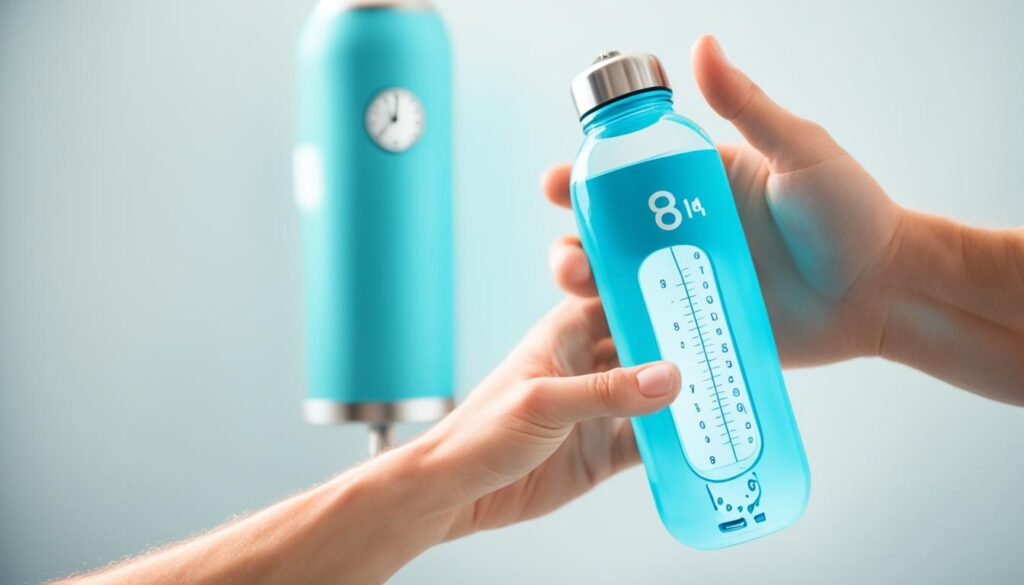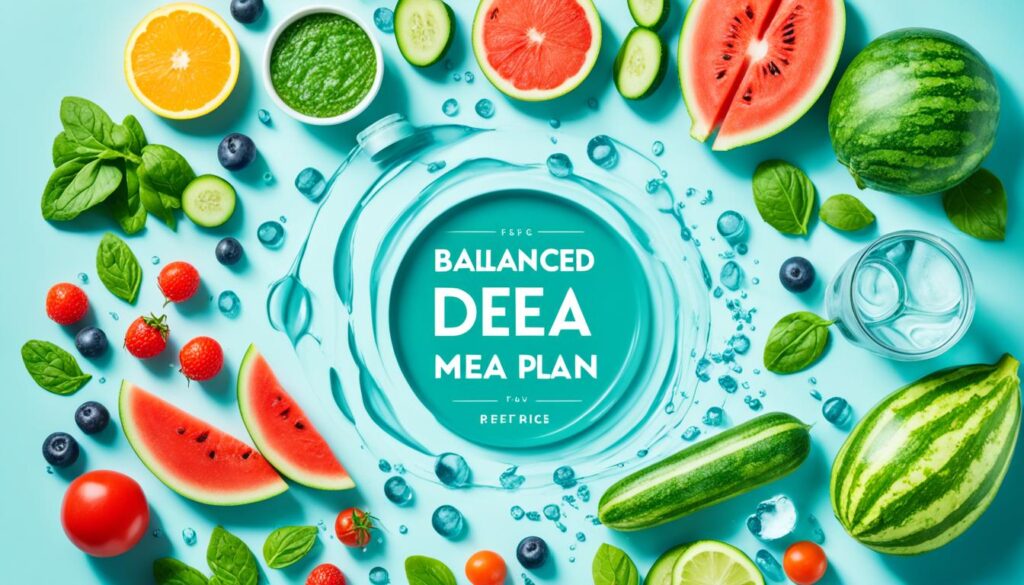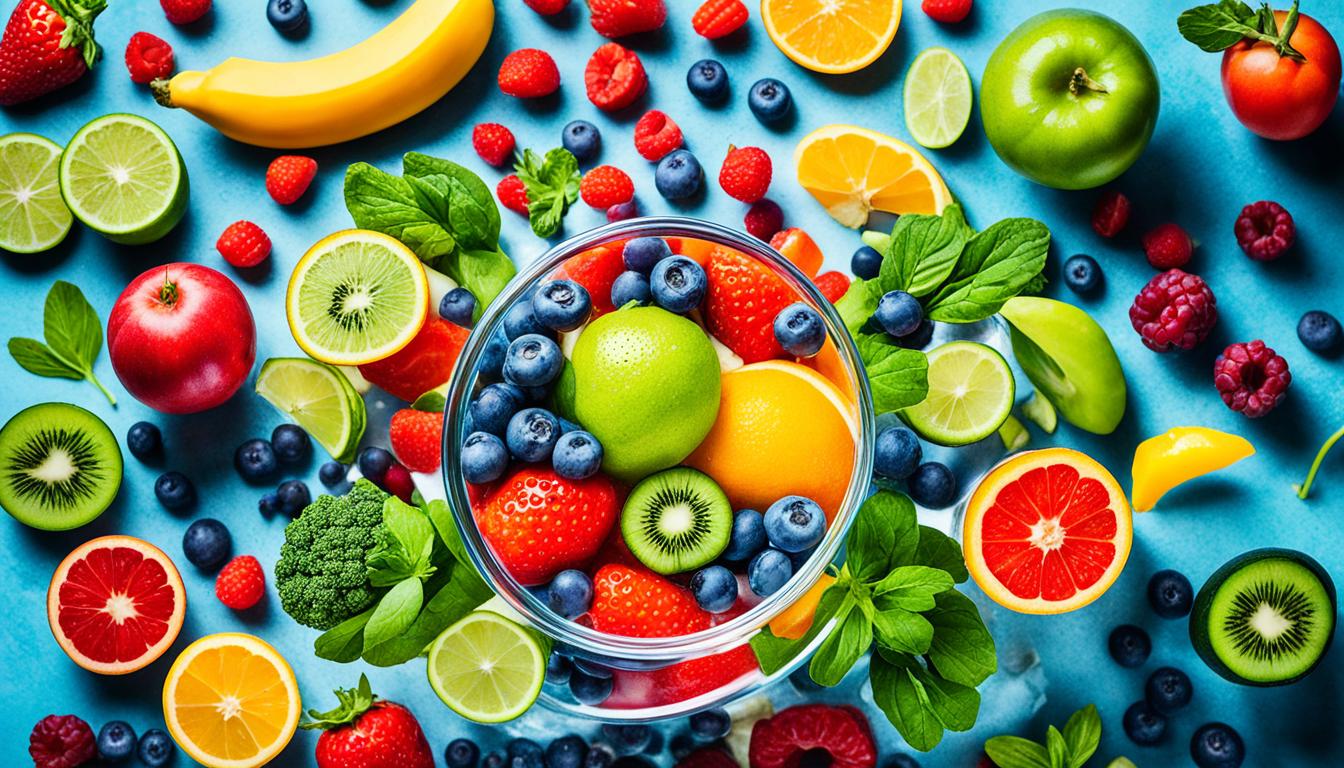Water is key to a healthy body, making up about 60 percent of us. It helps move nutrients, keeps our temperature balanced, and shields our organs. Drinking enough water is also great for the skin. It acts as a moisturizer and stops us from losing too much fluid. Plus, staying hydrated helps our immune system work better. Some people believe that drinking water with a higher pH, like Alkame Water, is even better for you. They say it boosts your immune system because of its special structure and has antioxidants.
Using water to control calories is a smart plan. It lets you skip high-calorie drinks and saves you from too many calories. Also, drinking water can make you less hungry, speed up your metabolism, and help your body get rid of fat. To get the most out of drinking water, eat lots of foods that are full of it. This includes fruits, veggies, and some dairy. Grace O’s Delicious Living and FoodTrients cook up meals that are good for you. They point out these foods as essential for keeping hydrated when following a water-based diet.
Key Takeaways
- Vital Functions: Water accounts for 60% of the human body and is crucial for nutrient transportation, temperature regulation, and organ protection.
- Skin Health: Adequate hydration serves as a natural moisturizer, protecting against fluid loss.
- Immunity Boost: Alkaline water like Alkame Water can enhance immunity due to its antioxidants.
- Calorie Control: Replacing high-calorie drinks with water aids in reducing calorie intake, suppressing appetite, and boosting metabolism.
- Hydrating Foods: Foods high in water content, such as fruits, vegetables, and certain dairy products, are beneficial for maintaining hydration.
The Importance of Hydration for Weight Loss
Drinking enough water is key for losing weight and staying healthy. It helps control calories and boosts your metabolism. This means it helps you manage your weight well.
Water is vital for your body to work its best, affecting how fit and well you feel. It’s a simple but crucial part of staying healthy.
Benefits of Hydration
Drinking water helps you eat less. If you have two glasses before a meal, you might eat almost a quarter less food. Such studies show a clear link between water and eating fewer calories. This can also boost your metabolism by up to 3%.
An eight-week study found that drinking water before eating can help you lose weight. In this study, 50 women who were overweight lost some weight, body fat, and reduced their BMI. Plus, water helps break down fat, which can make losing weight easier.
Switching from sugary drinks to water can also help a lot. In fact, just by replacing one sugary drink with water, you might gain a half kilo (1.1 pounds) less weight over four years.
Common Signs of Dehydration
Knowing when you’re dehydrated is very important for those who want to lose weight. You might feel thirsty or have a dry mouth. You could also become tired easily or have headaches. Not drinking enough water can lead to constipation, dry skin, and feeling tired all the time.
If you recognize these signs, you can fix your hydration. This helps your body keep working well as you try to lose weight. For women, about nine cups of water a day is good, and for men, it’s about 13 cups. Meeting these daily water goals is essential for your health and well-being.
Water Diet Meal Plans: What to Drink and When
Choosing what to drink and the best times is key in a water diet. It’s important to drink water throughout the day to get the most out of it.
Daily Water Intake Recommendations
Experts suggest starting your day with 8 ounces of water. This rehydrates your body after sleeping. It’s also vital to drink water with meals and snacks. Nutritionist Sarah Adler advises tailoring your water intake based on your weight. She recommends between ½ to 1 ounce of water for each pound you weigh.
Best Times to Drink Water
Drinking water at key times can help your health. Here’s when to focus on water intake throughout your day:
- Upon Waking: Drinking water in the morning jumpstarts your metabolism and cleanses your body.
- Before Meals: A glass of water before eating can make digestion easier and curb overeating.
- During Meals: Drinking water with food helps with digestion and the body’s ability to absorb nutrients.
- Mid-Afternoon: Staying hydrated helps keep your energy up during the day.
- Before, During, and After Exercise: Hydration is key to keeping your performance and energy steady during workouts.
Following these suggestions can help align your water intake with daily life. This boosts your energy and health.

Foods That Keep You Hydrated
It’s key to stay hydrated. You can do this by drinking water and eating foods rich in water. This combo helps meet your daily hydration needs.
Fruits and veggies are full of water, with over 90% in some. Cucumbers are at the top with 95% water, and iceberg lettuce follows with 96%. Add them to your salads or eat them as snacks to stay hydrated.
- Cucumbers: 95% water content
- Iceberg lettuce: 96% water content
- Tomatoes: 94% water content
- Zucchini: 94% water content
- Watermelon: 92% water content
- Strawberries: 91% water content
- Cantaloupe: 90% water content
- Peaches: 89% water content
- Oranges: 88% water content
There are more foods that help keep you hydrated too. Skim milk is 91% water and is good after working out because it has important electrolytes. Broths and soups, with 92% water, also give you water and nutrients.
Hydrating foods do more than hydrate; they give you vitamins and minerals for good health. Strawberries, at 91% water, are full of vitamin C. This helps your immune system. Tomatoes, 94% water, have lycopene, which has many health benefits.
| Food | Water Content (%) |
|---|---|
| Cucumber | 95 |
| Lettuce | 96 |
| Tomatoes | 94 |
| Zucchini | 94 |
| Watermelon | 92 |
| Strawberries | 91 |
| Cantaloupe | 90 |
| Peaches | 89 |
| Oranges | 88 |
Eat a mix of these hydrating foods every day. This helps you stay hydrated and keeps your meals nutritious and balanced. Adding these foods to your routine is a great way to boost your hydration plan.
Creating a Balanced Water Diet Meal Plan
To create a balanced water diet, mix foods that hydrate with careful water intake. This helps keep you hydrated and full while meeting your nutritional goals.
Incorporating Hydrating Foods
Adding foods like cucumbers, lettuce, and watermelon to your meals boosts hydration. They bring fluids and important nutrients to the table. Vegetables and fruits high in water help you feel full and hydrated, key for diet success.
Sample Meal Plan
A balanced meal plan targets 2,000 to 2,200 daily calories through three meals and snacks. It details a day’s food to show how you can eat for health and hydration:

| Meal | Calories | Food Items |
|---|---|---|
| Breakfast | 400-600 | Oatmeal with chia seeds, blueberries, and a cup of water |
| Morning Snack | 100-250 | Sliced cucumber and hummus |
| Lunch | 400-600 | Grilled chicken salad with mixed greens, tomatoes, and a cup of water |
| Afternoon Snack | 100-250 | Apple slices with almond butter |
| Dinner | 400-600 | Baked salmon, quinoa, steamed broccoli, and a cup of water |
| Evening Snack | 100-250 | Greek yogurt with honey and berries |
This plan mixes hydrating foods with the right calories. For optimal fluid intake, women should drink 9 cups of water, men 13. It’s best to adjust portion sizes to fit personal needs and consult with a dietitian if needed.
Hydration Tips and Tricks
When you’re dieting, staying hydrated needs more than just water. It’s key to mix in other drinks and keep track of how much you drink. This is so you can match your water needs to what your body truly requires.
Hydrating Beyond Water
Many beverages and foods are great for keeping you hydrated. For example, a cup of coconut water offers 9% of your daily potassium. But for some people, it can lead to feeling bloated. Beef bone broth is another good choice, with 6% of the DV for phosphorus and 21% for sodium. It helps you get back lost electrolytes. Also, an 8-ounce glass of 2% milk is almost 89% water and is rich in calcium and potassium. Some studies suggest it hydrates you better than water alone. Yogurt, with an 85% water content, is another good option. It not only helps you reach your hydration goals but also gives you probiotics.
Monitoring and Adjusting Your Water Intake
Keeping hydrated requires watching and adjusting your water intake. It’s vital to know what your body needs, especially when the weather is hot or if you’re exercising more. Watch for dehydration signs like a dry mouth, tiredness, or dark urine. They show you need to drink more. Hydration apps can be really helpful, making you more aware of your needs. And it’s smart to follow expert advice, for example, not overdoing it on sodium. This is especially true if you love sodium-rich choices like bone broth.
| Beverage/Food | Water Content | Key Nutrients |
|---|---|---|
| Raw Watermelon (1 cup) | 92% | Potassium |
| Gazpacho | 94% | Vitamin C |
| 2% Milk (8 oz) | 89% | Calcium, Potassium |
| Yogurt | 85% | Probiotics |
| Cucumber | 95% | Various Nutrients |
Using these hydration tips for dieting helps you keep a good balance in staying hydrated. This supports your health and helps with weight loss. By keeping an eye on how much water you drink and adding different drinks, you can keep your hydration in check. This can boost the good results of your diet.
Conclusion
Adding water diet meal plans into your life is key for losing weight and staying healthy. Water is vital for many body functions, like keeping your temp normal and aiding in weight loss. It helps your digestion, makes your skin glow, and keeps you feeling good.
To get the most out of a water diet, you need to drink the right amount for you. Listen to what your body tells you about thirst and drink more as needed. Eating water-rich foods, like fruits and veggies, helps too. They keep you hydrated and support your health goals.
A smart water diet and keeping track of your water intake are a solid diet strategy. If you keep up with this plan, you’ll see major health benefits. A hydrated body works better, helping you reach your weight goals and stay fit.




